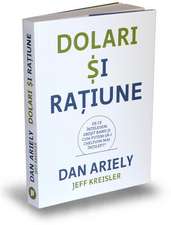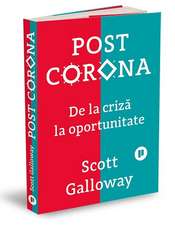Insurance and Behavioral Economics: Improving Decisions in the Most Misunderstood Industry
Autor Howard C. Kunreuther, Mark V. Pauly, Stacey McMorrowen Limba Engleză Paperback – 27 ian 2013
| Toate formatele și edițiile | Preț | Express |
|---|---|---|
| Paperback (1) | 271.01 lei 6-8 săpt. | |
| Cambridge University Press – 27 ian 2013 | 271.01 lei 6-8 săpt. | |
| Hardback (1) | 701.09 lei 6-8 săpt. | |
| Cambridge University Press – 27 ian 2013 | 701.09 lei 6-8 săpt. |
Preț: 271.01 lei
Nou
Puncte Express: 407
Preț estimativ în valută:
51.86€ • 54.14$ • 42.92£
51.86€ • 54.14$ • 42.92£
Carte tipărită la comandă
Livrare economică 04-18 aprilie
Preluare comenzi: 021 569.72.76
Specificații
ISBN-13: 9780521608268
ISBN-10: 0521608260
Pagini: 338
Ilustrații: 13 b/w illus. 10 tables
Dimensiuni: 152 x 228 x 18 mm
Greutate: 0.48 kg
Ediția:New.
Editura: Cambridge University Press
Colecția Cambridge University Press
Locul publicării:New York, United States
ISBN-10: 0521608260
Pagini: 338
Ilustrații: 13 b/w illus. 10 tables
Dimensiuni: 152 x 228 x 18 mm
Greutate: 0.48 kg
Ediția:New.
Editura: Cambridge University Press
Colecția Cambridge University Press
Locul publicării:New York, United States
Cuprins
1. Purposes of this book; 2. An introduction to insurance in practice and theory; 3. Anomalies and rumors of anomalies; 4. Behavior consistent with benchmark models; 5. Real world complications; 6. Why people do or do not demand insurance; 7. Demand anomalies; 8. Descriptive models of insurance supply; 9. Anomalies on the supply side; 10. Design principles for insurance; 11. Strategies for dealing with insurance-related anomalies; 12. Innovations in insurance markets through multi-year contracts; 13. Publicly provided social insurance.
Recenzii
'For too many people insurance is a mystery not worth solving. The authors of Insurance and Behavioral Economics shed valuable light on insurance products and providers in an insightful examination for the benefit of consumers, analysts, and students of the business. Even the industry would be wise to study the authors' research, conclusions, and recommendations.' Franklin Nutter, President, Reinsurance Association of America
'A challenging and surprisingly engaging analysis of how insurance markets really function. You don't need to agree with all the analyses or recommendations … to recognize that this book is going to be widely read and broadly influential among insurers and regulators.' Leigh Ann Pusey, President and CEO, American Insurance Association
'This book presents a brilliant analysis of the insurance industry as it exists today and will evolve tomorrow. Insurance is fundamental to everything we do: we can see in this book how we can make much better use of it, to improve all of our lives.' Robert Shiller, Yale University
'Insurance is a vital tool for managing risk, but it is misunderstood by consumers, regulators, and industry executives in ways that greatly reduce its effectiveness. In this superb book, Kunreuther, Pauly, and McMorrow employ insights from behavioral economics to clarify these misunderstandings and point the way toward more rational use of insurance to enhance individual and societal welfare.' Paul Slovic, University of Oregon and author of The Feeling of Risk
'Regulators and policy makers have long known that consumers often make seemingly irrational choices when it comes to insurance. Drawing on behavioral economics, the authors provide a framework to understand insurance market anomalies - in both demand and supply - and to evaluate alternative policy prescriptions. Their work is a significant contribution to the discussion on how to best structure insurance regulation to the benefit of consumers and society.' Terri M. Vaughan, Chief Executive Officer, National Association of Insurance Commissioners
'Psychologically, it's hard for most of us to take the initiative on long-term, ill-defined risks. Three scholars - Howard C. Kunreuther and Mark V. Pauly of the University of Pennsylvania and Stacey McMorrow of the Urban Institute - show this in their book. But they argue that if we're aware of them, these psychological impediments can be reduced, and they urge the innovation of long-term risk management contracts that address the problem of climate change.' The New York Times
'A challenging and surprisingly engaging analysis of how insurance markets really function. You don't need to agree with all the analyses or recommendations … to recognize that this book is going to be widely read and broadly influential among insurers and regulators.' Leigh Ann Pusey, President and CEO, American Insurance Association
'This book presents a brilliant analysis of the insurance industry as it exists today and will evolve tomorrow. Insurance is fundamental to everything we do: we can see in this book how we can make much better use of it, to improve all of our lives.' Robert Shiller, Yale University
'Insurance is a vital tool for managing risk, but it is misunderstood by consumers, regulators, and industry executives in ways that greatly reduce its effectiveness. In this superb book, Kunreuther, Pauly, and McMorrow employ insights from behavioral economics to clarify these misunderstandings and point the way toward more rational use of insurance to enhance individual and societal welfare.' Paul Slovic, University of Oregon and author of The Feeling of Risk
'Regulators and policy makers have long known that consumers often make seemingly irrational choices when it comes to insurance. Drawing on behavioral economics, the authors provide a framework to understand insurance market anomalies - in both demand and supply - and to evaluate alternative policy prescriptions. Their work is a significant contribution to the discussion on how to best structure insurance regulation to the benefit of consumers and society.' Terri M. Vaughan, Chief Executive Officer, National Association of Insurance Commissioners
'Psychologically, it's hard for most of us to take the initiative on long-term, ill-defined risks. Three scholars - Howard C. Kunreuther and Mark V. Pauly of the University of Pennsylvania and Stacey McMorrow of the Urban Institute - show this in their book. But they argue that if we're aware of them, these psychological impediments can be reduced, and they urge the innovation of long-term risk management contracts that address the problem of climate change.' The New York Times
Notă biografică
Descriere
This book examines the behavior of individuals at risk and insurance industry policy makers involved in selling, buying and regulation.














